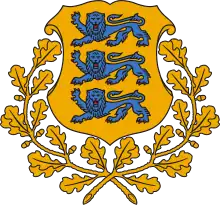August Rei | |
|---|---|
 | |
| Prime Minister in duties of the President | |
| In office 9 January 1945 – 29 March 1963 | |
| Preceded by | Jüri Uluots |
| Succeeded by | Aleksander Warma |
| 9th State Elder of Estonia | |
| In office 4 December 1928 – 9 July 1929 | |
| Preceded by | Jaan Tõnisson |
| Succeeded by | Otto Strandman |
| Personal details | |
| Born | 22 March 1886 Kurla, Kreis Fellin, Governorate of Livonia, Russian Empire |
| Died | 29 March 1963 (aged 77) Stockholm, Sweden |
| Political party | Social Democratic Workers' Party Socialist Workers' Party |
| Alma mater | Saint Petersburg State University |
August Rei VR III/1 (22 March [O.S. 10 March] 1886[1] – 29 March 1963) was an Estonian politician, the Head of State (Riigivanem) of Estonia in 1928–1929, and the Prime Minister in duties of the President of Estonia in the government in exile in 1945–1963.
Early life and education
August Rei was born in Kurla, Pilistvere parish, Kreis Fellin, Governorate of Livonia, Russian Empire (now Türi Parish, Järva County). Rei studied in the Tartu Emperor Alexander High School (the former State High School of the Livonian Governorate), but graduated from the Novgorod State High School. In 1904–1905 and 1907–1911, studied law in the St. Petersburg University.
Beginnings of political influence
In 1905–1907, Rei participated in the Russian Revolution of 1905. In 1906, he edited the underground paper Sotsiaaldemokraat (Social Democrat) in Tallinn. Between 1912 and 1913, he was in compulsory army service. In 1913–1914 he worked as a lawyer in Viljandi. In 1914–1917 Rei was an artillery officer in World War I at the Fort of St. Petersburg. In 1917 and 1918 he was in the Estonian army units (formed after the Second Russian Revolution in March 1917 by the initiative of Estonian politicians, who achieved the permission to concentrate the Estonian soldiers). He was the Assistant Chairman of the Supreme Committee of the Estonian military. In 1917 and 1919, he was the Editor-in-Chief of the paper Sotsiaaldemokraat. Between 1927 and 1928 he was the editor of Rahva Sõna (Word of the People). Rei was one of the leaders of the moderate faction of Estonia's social democratic movement. Up to 1936 he also worked as a lawyer and defended Ado Birk in 1927. He received an Honorary Doctorate in Law from Tartu University.
Career
- Member of the Estonian Provincial Assembly (Maapäev): 1917–1919
- Minister of Labour and Social Welfare of the Provisional Government; Deputy Prime Minister; Acting Minister of Education: 1918–1919
- Chairman of the Constituent Assembly (Asutav Kogu): 1919–1920
- Head of the Estonian Delegation to the Estonian-Latvian Border Committee: 1923–1925
- Speaker of the II Riigikogu; 1925–1926[2]
- State Elder (Head of State): 4 December 1928 – 9 July 1929
- Minister of Foreign Affairs: 1932–1933
- Deputy Minister of Foreign Affairs: 1936–1937
- Envoy to the Soviet Union: 1938–1940
- Minister of Foreign Affairs in exile: 1944–1945
- Prime Minister in capacity of the President of the Republic in exile: 9 January 1945 – 29 March 1963
Literary interests
Rei wrote and translated socialist works and published memoirs.
Awards
- 1920 – Cross of Liberty III/I
- 1930 – Order of the Cross of the Eagle I
Bibliography
- Sotsialdemokraatia taktika põhimõtted Tallinnas : Tööliste kirjastusühisus, 1921 (Narva : Kärner) (in Estonian)
- Have the Baltic countries voluntarily renounced their freedom : an exposé based on authentic documentary evidence by August Rei. New York : World Association of Estonians, 1944 (in English)
- Have the small nations a right to freedom and independence? by August Rei. London : Boreas, 1946 (in English)
- The drama of the Baltic peoples by August Rei; preface by Eugene Lyons. Stockholm: Vaba Eesti, 1970 (Åbo : Sydvästkusten) (in English)
References
- ↑ "August Rei sünd" (in Estonian). Histrodamus. Archived from the original on 7 November 2017. Retrieved 8 June 2013.
- ↑ "Riigikogu juhatus". Riigikogu.

